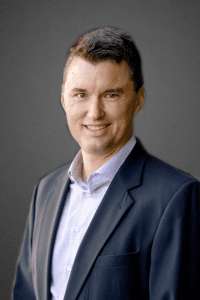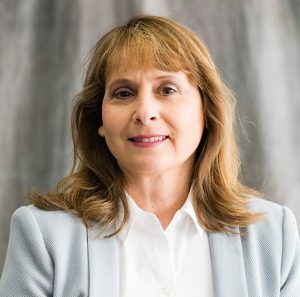
5 Questions with Kathy Fowler, Director of Marketing at American Gene Technologies®
“5 Questions With…” is a recurring BioBuzz series where we reach out to interesting people to share a little about themselves, their work, and maybe something completely unrelated. This week we welcome Kathy Fowler, Director of Marketing at American Gene Technologies®
Kathy Fowler has 25+ years of experience in television, with a specialty in medical reporting. She was medical reporter at Washington, D.C.’s ABC affiliate WJLA-TV; WJZ-TV in Baltimore, Maryland; NBC-17 in Raleigh, N.C.; and WBNS in Columbus, Ohio. Her ability to simplify complicated medical topics and tell compelling human interest stories earned her a National Emmy Award and Edward R. Murrow Award, several Associated Press awards and several nominations for local Emmys.
Kathy became a reporter to make a difference, and went into marketing and public relations for the same reason. She believes in working with clients to spotlight products and services that improve lives. Her skill and passion for marketing and public relations makes her an invaluable asset to clients. She relentlessly pursues their marketing and public relations goals with exceptional results.
1) Please introduce yourself to our audience by looking back at your education, training, and career.
I learned to multitask and juggle competing priorities while I was a journalism student at Ohio State University. I started a pavement-coating business called Tru Color, but was also working at a radio station, all while attending college. I ultimately became a medical reporter, which is when I really learned the art of storytelling — spending about 10 years translating complicated technical information into understandable stories on deadline for a general audience.
That experience also taught me that, from an industry perspective, if you’re trying to lead or innovate or disrupt the status quo, you have to know how to communicate. You’re doing things no one has done before — which could even be scary to your audience, since most people tend to fear the unknown — so you have to tell your story in an accessible, realistic and transparent manner. Mastering that skill is especially important in the post-COVID era, when a lot of people are distrustful of both science and the media.
2) You have an extensive background in covering the life sciences industry spanning 10+ years- What is one skill or lesson you learned early on that you still utilize today?
The best way to communicate is through storytelling. It’s a lesson first taught by our ancient ancestors. From the hieroglyphic stories painted on cave walls, to stories in the scriptures of various faith traditions, to ghost stories sitting around a campfire, the human brain loves good storytelling.
It doesn’t matter who the audience is, or how well educated they are, or how well versed they might be in the topic: you have to connect with your audience on a human level. That’s the only way to establish a level of trust and credibility so people will be open to the information or message you want to convey. Communicating through stories has been the best way to do that throughout human history.
3) Having worked with American Gene Technologies as a client for some time now, What are some things coming down the pipeline that excites you to have been a part of it?
As a former medical reporter who covered medical news and Big Pharma for more than a decade, I reported on a lot of potential cures. But I started to wonder if anyone was actually working on real cures. It seemed like there was more R&D dedicated to “treatments.”
I’m always in awe of what scientists and physicians have been able to innovate, but I became a bit jaded when it came to the search for cures. As a reporter you are always skeptical by nature, but I just kept seeing the drug companies work on changing their big blockbuster drugs once they became generic, and I came to wonder if they were even interested in actually curing diseases rather than keeping people buying never-ending treatments.
That’s one of the reasons I’m so excited about the work of American Gene Technologies. CEO Jeff Galvin wants to create real cures and end suffering. Their HIV cure clinical trial has been going so well that we can nearly see the day when the virus can be cleared from people living with HIV. And the potential of gene therapy to cure other diseases is what motivates the entire American Gene team.
4) The life sciences industry is ever-evolving and hard to keep up with from a media standpoint. What is a word of advice you would give to your younger self if given the chance to talk to them?
I think we need to make sure science isn’t controversial. The distrust that has developed about medicine and science is very concerning. Looking back, we should have been educating the public about how science works on a continual basis.
It’s just like journalism. All of a sudden people don’t trust journalism, science, or even the government. Maybe we needed to not take people’s trust for granted. We needed to educate the public on how things happen and how science really works.
5) If you had to build a team of 3 celebrities to help you rebuild modern civilization after a disaster, Who would you choose and why?
Well I’m not sure I’d choose “celebrities,” but if they’re all I had to work with I would look for individuals who brought three vital elements to the table:
1. Someone who is positive and a great communicator and leader. I’d pick Oprah for this one.
2. Someone who is brilliant and an innovator. We lost Steve Jobs when he passed away, so now I’d go with Bill Gates.
3. And finally, someone who takes care of all the little things that no one would want to do — someone with the human (and humanitarian) qualities of the late Mother Teresa. Maybe one of the Nobel Peace Prize winners, although they’re not often celebrities. Or — and this might be a a stretch — maybe Dolly Parton or Lady Gaga.
- About the Author
- Latest Posts
BioBuzz is a community led, experience focused, biotech and life sciences media and events company. BioBuzz highlights regional breaking news, industry professionals, jobs, events, and resources for business and career growth. Their weekly newsletter is subscribed to by thousands in the BioHealth Capital Region and Greater Philadelphia as the go-to for industry updates.





